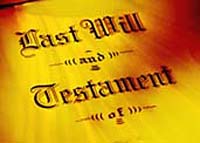 Without a formal direction, your wishes must be interpreted and your estate must be settled by a probate court judge. The process is expensive and encourages disputes. But divvying up wealth is a whole lot easier than handing your children off to the state to determine where they go and how their care will be paid for. Just imagine the two grandmothers fighting over custody of your children?
Without a formal direction, your wishes must be interpreted and your estate must be settled by a probate court judge. The process is expensive and encourages disputes. But divvying up wealth is a whole lot easier than handing your children off to the state to determine where they go and how their care will be paid for. Just imagine the two grandmothers fighting over custody of your children?
For many young parents death seems like a long ways away. Regardless of how one feels, Houston parents of all ages should have their affairs in order—including guardianship. New Hampshire Magazine’s May 2015 issue addresses this issue and offers sound advice through an article titled “Don't put off writing down your last words.”
If you just can’t decide on a guardian, you should still move ahead with your estate planning. It is better to have this issue undecided than to die without a will. That said, the article suggests that it’s a good idea to nominate two people. That way you have one to be the guardian of the children and a second to be a trustee of the funds dedicated to their care.




























